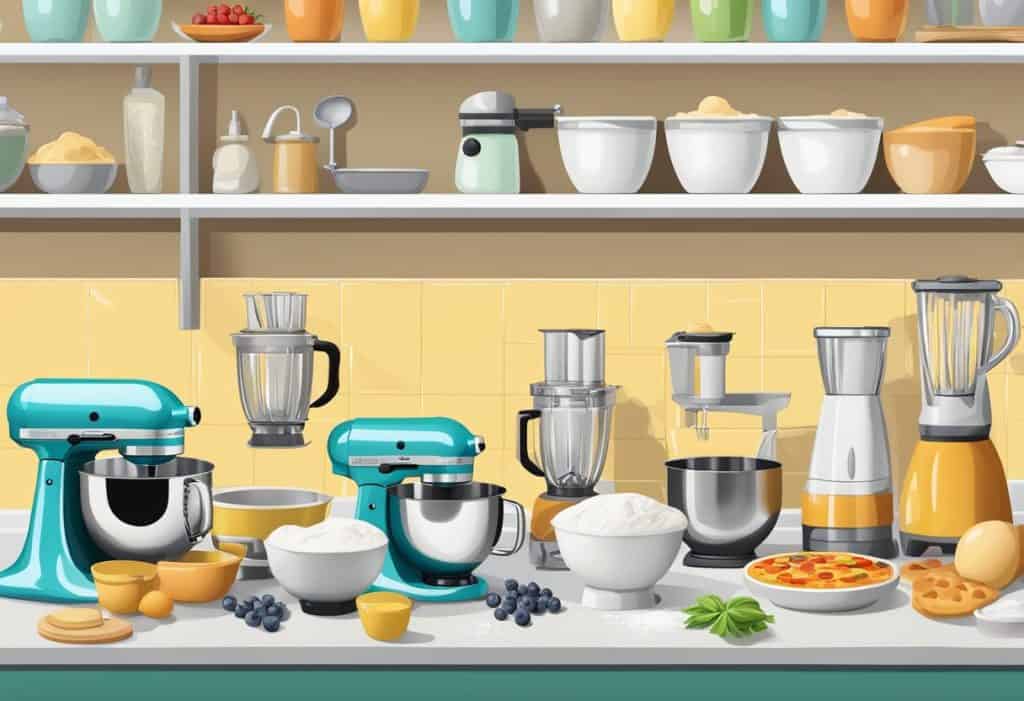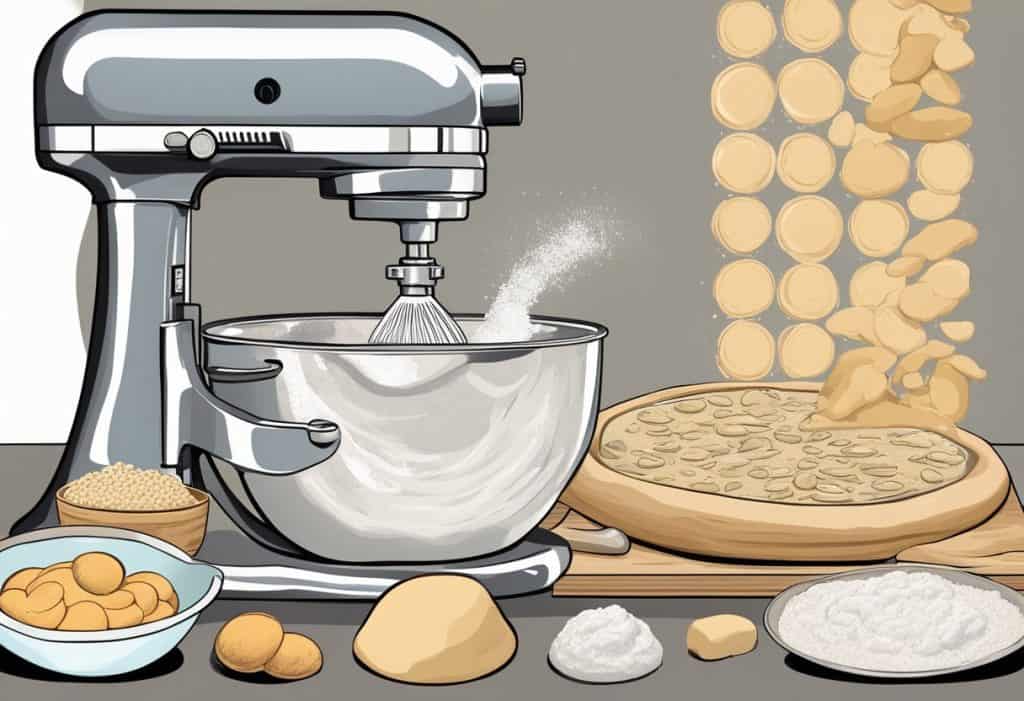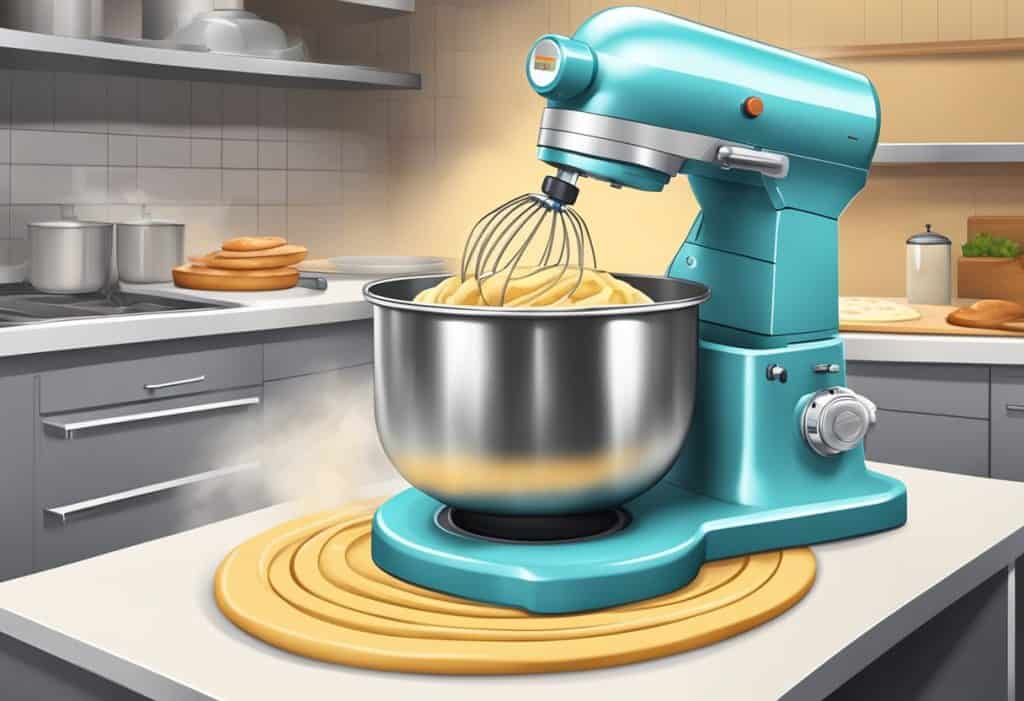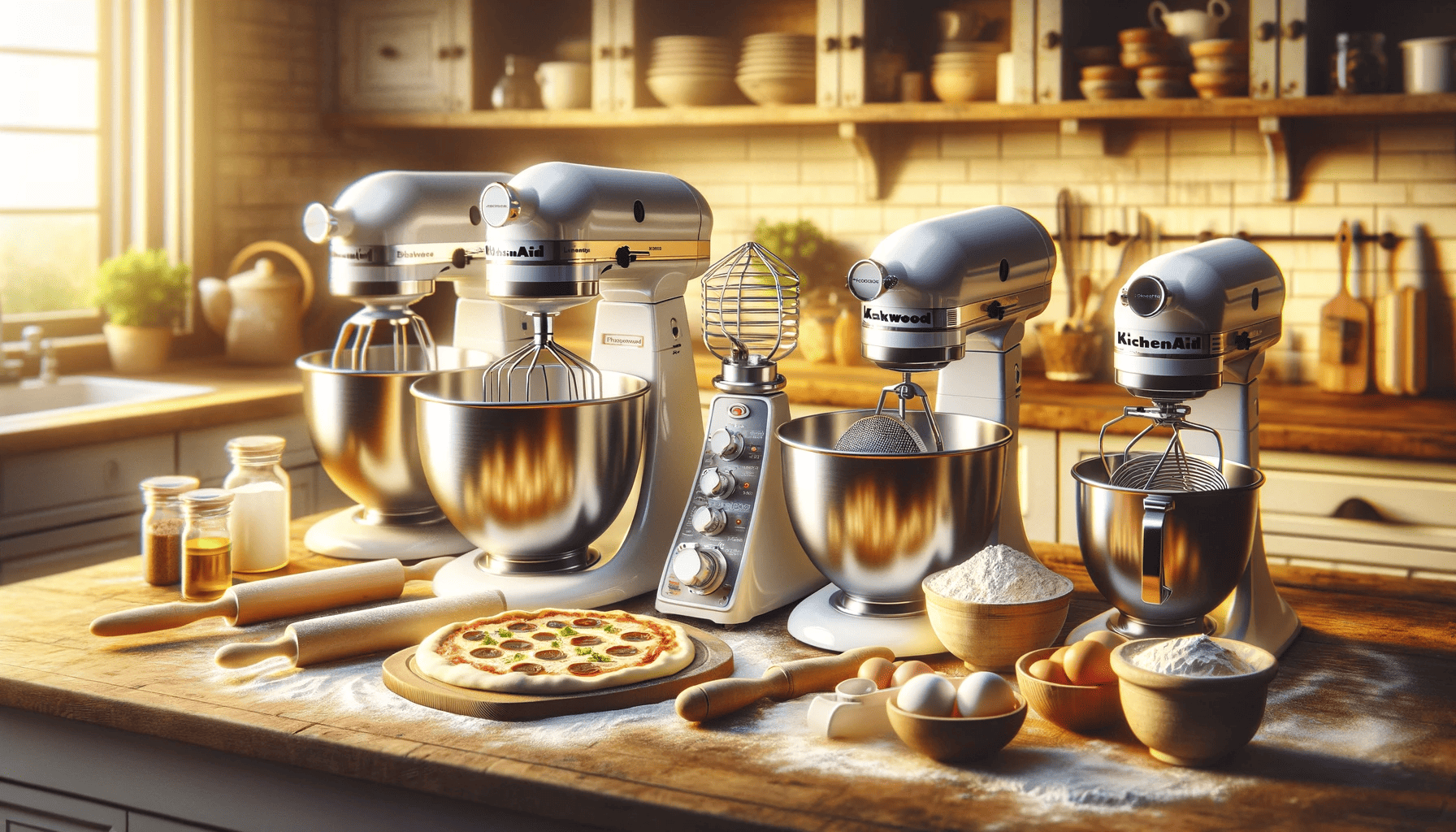When making pizza, the right dough mixer is crucial for efficiency and texture. Pizzaiolos have their go-to mixers, prioritizing durability, power, and versatility for handling specific dough preferences. Choose a mixer that suits your needs to ensure a crust that’s just the way you like it.
Understanding Dough Capacity and Mixer Power
When selecting a mixer for pizza dough, two critical factors play a key role: dough capacity and motor power.
Dough Capacity The size of the mixer’s bowl determines how much dough you can mix at one time, known as bowl capacity. Here’s a quick look at different types of mixers:
- Spiral Mixer: Ideal for pizza dough with its ability to maintain dough structure.
- Typical capacity: 5 – 300+ lbs of dough.
- Stand Mixer: More versatile for home use.
- Typical capacity: 3 – 8 lbs of dough.
Motor Power Motor power, usually measured in horsepower (HP) or watts, affects how well the mixer can handle thick pizza dough. More power means better gluten development without overheating the dough.
- Spiral Mixer:
- Power range: 1/2 HP for small models, up to 5 HP for large industrial mixers.
- Stand Mixer:
- Power range: 250 watts to 1,300 watts.
Mixing Speed & Temperature Your mixer should have variable speeds for gradual incorporation of ingredients and to control dough temperature – important for gluten development. High mixing speeds can increase dough temperature, which may affect yeast activity and dough structure.
When picking out a mixer, keep these points in mind:
- Match the mixer’s dough capacity to your needs.
- Ensure the motor power is sufficient to handle your typical dough batch without struggling.
- Look for mixers that offer variable mixing speeds to retain dough structure and consistency.
Navigating the world of dough mixers becomes a whole lot easier once you understand your capacity needs and the power required for kneading perfect pizza dough.

When you’re hunting for the perfect pizza dough mixer, you’ve got to weigh the differences between mixers and assess the bite it’ll take from your wallet.
Choosing the Right Mixer for Pizza Dough
Stand Mixer vs Spiral Mixer: Key Differences
Stand Mixer:
- Versatility: Ideal if you’re aiming to mix more than just pizza dough. Great for cakes, cookies, and even mashed potatoes.
- Mixing Action: Utilizes a planetary mixing action where the attachment orbits and the bowl is stationary, offering good distribution for a variety of dough types, including sourdough and high hydration dough.
Spiral Mixer:
- Dedicated Dough Expert: The go-to machine specifically for bread doughs, getting that chewy, structured crust you’re after.
- Mixing Technique: Features a rotating bowl with a spiral hook that remains in a fixed position, excelling in developing gluten structure, which is crucial for pizza dough.
Budget Considerations for Pizza Dough Mixers
| Mixer Type | Pros | Cons | Price Range |
|---|---|---|---|
| Stand Mixer | Multiple uses, good for home bakers. | Less efficient for large dough batches | $50 – $500 |
| Spiral Mixer | Best for large, dense dough batches. | Limited to dough, professional level. | $500 – $5,000+ |
- Budget Tip: A stand mixer is a wallet-friendly option, starting as low as $50 for a basic model.
- Long-Term Investment: Consider splurging on a spiral mixer if pizza dough is your main baking focus — they’re more durable and efficient for heavy dough but come with a higher price tag.
Maximizing Dough Quality with the Right Mixer Features
You’re on the hunt for the perfect pizza dough, and — guess what? It’s not just about the ingredients; your mixer plays a major role, too. Here’s how the right mixer features can make or break the dough game.
Essential Mixer Features:
- Speed Control: You need a mixer that lets you adjust the speed. Slow speeds mix the dough without overworking it, preserving texture.
- Timer: A built-in timer ensures consistent mixing time, a key to replicating that dream dough batch after batch.
- Dough Hook Design: The hook should imitate hand-kneading for top-notch gluten development.
Dough Quality Factors:
- Consistency: A steady mixer maintains dough uniformity.
- Structure: With the right hook action, your dough will have the perfect chew.
Gluten Development and Dough Structure:
- It’s all about strategy. Mix slow and long enough for the gluten networks to form, giving your pizza base strength and elasticity.
| Dough Attributes | Desired Outcome |
|---|---|
| Texture | Smooth & Stretchy |
| Air Incorporation | Even Distribution |
Dough Temperature:
- Did you know mixers can heat your dough? Look for a model that keeps its cool to avoid prematurely activating the yeast.
Remember, small details have big impacts on dough quality. Your mixer should empower you, not hold you back. Now go forth and mix with confidence!
Navigating Mixer Brands and Models for Pizza Dough

When you’re in the market for a mixer to handle pizza dough, remember that the motor strength, capacity, and build quality are crucial factors.
The Best Stand Mixers for Pizza Dough
KitchenAid and Kenwood are household names that offer dependable stand mixers suitable for pizza dough.
- KitchenAid Artisan Series: With a 325-watt motor and a 5-quart stainless steel bowl, this mixer is not only versatile but also powerful enough for your home pizza dough needs.
- Kenwood Chef XL: For a bit more power, the Kenwood Chef XL provides a 1200-watt motor and a 6.7-quart bowl, ideal for larger batches, especially if you entertain often or have a big family.
Top Spiral Mixers for Perfect Pizza Dough
For professional settings or high-volume dough making, spiral mixers like the Empire IRIS Spiral Arm Mixer are the way to go.
- Empire IRIS Spiral Arm Mixer: Specifically designed for heavy dough and frequent use, this mixer comes with a reinforced structure and a capacity that suits small to medium pizza establishments perfectly.
Remember, choosing between a stand or spiral mixer boils down to your volume of dough and usage frequency. Stand mixers are great for home use, while spiral mixers are tailored for professional environments.
Essential Accessories for Stand Mixers
When you’re knee-deep in pizza dough and craving that perfect crust, your stand mixer can be your best pal—especially with the right accessories. Let’s break down the must-haves:

Spiral Hook: Ideal for heavy pizza dough, the spiral hook, sometimes called a ‘dough hook,’ works magic by kneading efficiently. It’s all about that twist which mimics hand-kneading without tiring out your arms.
Flat Beater (K-beater): For your initial mixing, the flat beater— or K-beater— is perfect. It mixes the dough ingredients evenly before the kneading stage. Think of it as your prep cook, getting everything ready for the main event.
Dough Hook: Different from the spiral, the traditional C-shaped dough hook is also great for kneading pizza dough, though it might not handle heavy dough as well as the spiral. Still, for a standard homemade pizza dough, it does the trick.
Here’s a quick glance at what each accessory does:
| Accessory | Use-Case for Pizza Dough | Secret Power |
|---|---|---|
| Spiral Hook | Kneading thick, heavy dough. | Simulates hand-kneading. |
| Flat Beater | Initial mixing of ingredients. | Ensures even mixing. |
| Dough Hook | Kneading standard or softer dough variants. | Good for a variety of doughs. |
Remember, your pizza is only as good as the dough you make. Equip that mixer with the best players in the game—the spiral hook, flat beater, and dough hook—and you’re on your way to becoming a pizza pro. Happy mixing!
Key Features of Spiral Mixers
When you’re looking to make the perfect pizza dough, a spiral mixer is your go-to buddy. These mixers are designed to gently knead the dough, maintaining just the right temperature and consistency that artisan bread and pizza dough require.

Here’s what sets them apart:
- Gentle Kneading: Your dough gets a massage instead of a beating. The spiral hook and rotating bowl work in harmony, mimicking hand kneading to develop gluten without overworking the dough.
- Consistent Dough Temperature: These mixers are champs at keeping dough cool. The gentle action means less friction and, in turn, less heat. Your dough stays at the ideal temp for optimal fermentation.
- Two-Speed Settings: You’ve got options. A lower speed mixes your ingredients without slinging flour all over, and a higher speed develops the gluten just right, leading to that coveted chewy crust.
- Large Capacity: You can mix big batches without a sweat. Whether you’re making dough for a family pizza night or a big bash, these mixers can handle it.
| Feature | Benefit |
|---|---|
| Spiral Hook | Kneads dough gently, mimicking hand kneading |
| Rotating Bowl | Ensures even mixing |
| Two-Speed Motor | Customizes kneading for different dough types |
| Cool Dough Kneading | Preserves dough temperature |
| Capacity | Suitable for small to large batches |
So if you’re serious about your pizza or artisan bread game, consider a spiral mixer. It’s the silent hero behind many of the perfect crusts you crave.
Exploring Pizza Dough Varieties and Mixer Efficacy
When you’re in the thick of pizza-making adventure, nailing the perfect dough is key. Let’s break down Pizza Dough types and how different mixers stack up.

Traditional Dough: This is your standard go-to for classic pizzas. It’s not too tricky, and a decent stand mixer with a dough hook can work its magic just fine here.
Sourdough has a cult following for its tangy twist. It’s a bit more high-maintenance and demands gentle, consistent mixing — a tough ask for hand mixing but a breeze for a robust mixer with patience.
In the world of High Hydration Dough, you’re dealing with a sticky situation, quite literally. We’re talking dough that’s wetter than your average mix, which makes it a bit of a beast to handle. Without a sturdy mixer, you could end up with a gluey mess on your hands.
For Pizza-making, your mixer choice can be the secret sauce to efficiency and texture. Pizzaiolos often have their go-to mixers that can handle their specific dough-preferences with ease.
- Preferences of Pizzaiolos:
- Durability: Non-stop pizza production requires a mixer that can keep up.
- Power: No one’s got time for a motor that gives up halfway t ough a batch.
- Versatility: Dough today, maybe some artisan bread dough tomorrow?
Artisan bread dough often crosses paths with pizza dough in the mixer world. If you play your cards right, a versatile mixer could juggle both.
Remember, a mixer isn’t just a tool — it’s your dough’s dance partner in the ballroom of pizza perfection. Choose wisely, treat it right, and you’re in for a crust that’s just the way you like it.


